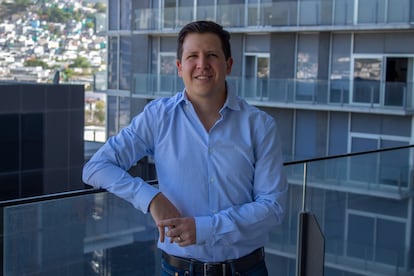Mauricio de Mucha: ‘Hair dryers use more energy than bitcoin mining’
The CEO of Red Girasol, the first ‘fintech’ company in Mexico to offer loans for solar-powered bitcoin mining, says he’s revolutionizing the country’s energy market


For Mexican solar-energy finance company Red Girasol, bitcoin mining – the practice of using massive amounts of energy to generate units of cryptocurrency – seemed like the only way they could escape the pandemic. The “fintech” (financial technology) company was just getting off the ground when their clients started returning all the equipment they had leased because they could no longer afford to make payments. That was when Mauricio de Mucha – the company’s 30-year-old CEO from the northeastern Mexican city of Monterrey – discovered that the true value of solar panels lay not so much in their worth as consumer goods, but in their potential to produce energy.
With all their equipment now back in their possession, the fledgling company is starting to lay the groundwork to develop Mexico’s first crypto-mining solar farm. De Mucha says the plan is to install the returned panels on a large plot of land in Puebla, a state in east-central Mexico with one of the highest solar energy potentials in the country. This, he says, is how Red Girasol plans to recover from the blow dealt by the pandemic, while also helping other businesses, especially the company’s former clients, get back on their feet by sharing in a portion of the crypto-mine’s profits.
Question. Can bitcoin ever really be “green”? Has it been easy to find traction for your idea in the Mexican market?
Answer. To a certain extent that was just a catchy phrase for the promo, but bitcoin is a technology, and technologies, by nature, are neutral – it’s like talking about the internet, or electricity, or a knife, which can be a really good thing, because it can help you to eat, or a really bad thing, because it can kill you. What we’re really doing that’s green is the mining, the operation, the whole mining initiative, really – overall, the emissions involved in this activity are negative. We’re transforming it from something bad for the environment into something that can help advance the fight against climate change. For every ton of CO₂ directly generated by the facility, we can offset the impacts by at least 1.5 to two tons.
Q. One of the main criticisms of bitcoin mining, especially in countries with high energy costs like Mexico, is that it uses a lot of energy. Do solar panels reduce these costs?
A. It’s an interesting question, because it’s hard to say what energy use is good and what energy use is bad. I mean, yes, crypto-mining consumes a lot of energy, but in relative global terms, it doesn’t even figure into the equation. As it turns out, hair dryers and Christmas lights actually consume more energy than crypto-mining. And what creates more value – humanity’s first decentralized currency or Christmas lights? Personally, I think energy is as fundamental as free speech, and I think we should all be free to decide what we use our energy for. It’s always important to have perspective and to take environmental impacts into consideration, and whenever we do something, we do it in relation to a baseline reference – a solar project is good for the environment because it means consuming less electricity from the grid, which is what bitcoin does. I mean, it’s consuming energy, of course, but it’s consuming energy because it’s generating value and it’s displacing other things that consume even more energy.
We don’t like to play the game of saying what’s good and what’s bad. I mean we’ve provided financing for gas stations, and our main niche is butcher shops, and meat consumption is one of the main sources of greenhouse gas emissions, because of everything that goes into the production process.
Q. Who are your typical clients?
A. We’re starting to see a very different type of clientele than what we are used to. Now we’re doing a thing we call “solar inclusion,” where we provide credit to convenience stores, butcher shops, and other small and medium-sized businesses – mostly businesses that use refrigeration. We’ve created a very flexible type of loan that allows us to provide credit transparently, and with a certain degree of informality, to sectors that we’re used to working with, especially businesses that are just getting started. Now that we’re promoting our new initiative, the profile of our client base is changing. We’re seeing younger people, people in their 20s, 30s, and 40s, with a different profile, with a higher level of education, very professional.
Q. Are you starting with just one farm, or how will it work?
A. People will take out a loan to buy their crypto-mining equipment, but we’ll operate it for them through a hosting service, similar to how servers used to work. It’s actually very similar to that, because now that mining is no longer just a hobby, but a major industrial activity, you need access to cheap energy, and to a place where you can make a lot of noise. That’s not something you can do in your home – you need a ventilation system that’s constantly pumping cold air in and hot air out. Today’s operations aren’t as easy as just setting something up in your house or in some small space, and so to facilitate this process of democratization and to make sure there aren’t any problems with the operation, we’re offering a solution that outsources that operation.
For reasons of geographic location and strategic alliances, we determined that Puebla is an ideal place to store the equipment, and to carry out the first pilot tests. After this pilot project, we’ll definitely be working on developing other large-scale solar farms to achieve greater energy cost savings, and, as much as possible, to ensure that the majority of the operations’ energy consumption comes from reclaimed solar equipment. The idea is to figure out how to continue generating value on top of what’s already there.
Q. There aren’t any other solar farms being used to mine cryptocurrency in Mexico?
A. No, not that we’re aware of. Mexico’s crypto-mining industry is still in its very early stages. There are other markets – the United States, for example, which has more mining than any other country in the world. And Texas is becoming a very strong player as well. It’s nothing new – bitcoin mining has been going on for more than 10 years. But now we’re seeing it adopted on a whole other level. It’s already legal tender in El Salvador, and in some countries in Africa. It’s being demystified, so to speak.
For a lot of people, crypto-mining might sound like something bad, or at least mysterious, but the reality is that mining is increasingly becoming an important innovative force in the energy sector. I think that the monetary disruption has already taken place, and now crypto-mining is starting to innovate the energy industry because of its unique qualities: it’s a mobile, flexible, modular load, and it has a number of benefits that can help de-stress power grids and make them more resilient.
Tu suscripción se está usando en otro dispositivo
¿Quieres añadir otro usuario a tu suscripción?
Si continúas leyendo en este dispositivo, no se podrá leer en el otro.
FlechaTu suscripción se está usando en otro dispositivo y solo puedes acceder a EL PAÍS desde un dispositivo a la vez.
Si quieres compartir tu cuenta, cambia tu suscripción a la modalidad Premium, así podrás añadir otro usuario. Cada uno accederá con su propia cuenta de email, lo que os permitirá personalizar vuestra experiencia en EL PAÍS.
¿Tienes una suscripción de empresa? Accede aquí para contratar más cuentas.
En el caso de no saber quién está usando tu cuenta, te recomendamos cambiar tu contraseña aquí.
Si decides continuar compartiendo tu cuenta, este mensaje se mostrará en tu dispositivo y en el de la otra persona que está usando tu cuenta de forma indefinida, afectando a tu experiencia de lectura. Puedes consultar aquí los términos y condiciones de la suscripción digital.








































